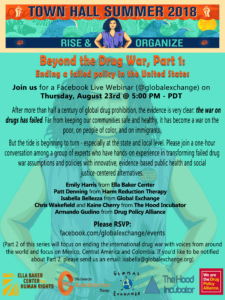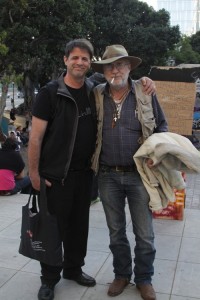The following piece was written by Laura Carlsen, director of the Americas Program of the Center for International Policy in Mexico City at www.cipamericas.org.
The presidential meeting this week between Mexico’s Felipe Calderon and Barack Obama looked from the outside like a hastily arranged exercise in damage control. But while most analysts emphasized the tensions between the neighboring nations going into the meeting, the real crisis behind the visit was the failure of what the two leaders most strongly agree on: the war on drugs south of the border.
Following a lengthy closed meeting, the presidents stood before the cameras to reaffirm their mutal commitment to a war that has cost 35,000 Mexican lives since 2007, with the death toll rising by often 50 homicides a day. Obama affirmed the U.S. strategy of increased engagement in the Mexican drug war, stating “We are very mindful that the battle President Calderon is fighting inside of Mexico is not just his battle, it’s also ours.” He promised to deliver $900 million this year of funds appropriated under the Merida Initiative, a security agreement launched in 2007 by the George W. Bush adminstration and extended indefinitely under Obama.
The binational relationship suffered some serious blows in the weeks preceding Calderon’s Washington visit. The release of thousands of Wikileaks cables between the U.S. Embassy in Mexico City and the State Department revealed U.S. officials’ deep concerns regarding the Mexican government’s capacity to carry out its high-risk war on drug cartels and wavering public opinion. Cable 10MEXICO83, for example, states that “the GOM’s (Government of Mexico’s) inability to halt the escalating numbers of narco-related homicides in places like Ciudad Juarez and elsewhere… has become one of Calderon’s principal political liabilities as the general public has grown more concerned about citizen security.” The cable cites “official corruption”, inter-agency rivalries, “dismal” prosecution rates and a “slow and risk averse” Mexican army.
In an interview with El Universal, Calderon responded angrily, calling the statements exaggerated, the ambassador “ignorant” and citing a lack of inter-agency coordination within the United States. Continued releases of the cables by the Mexican daily La Jornada promise more embarassments for both governments in attempting to portray a confident and united front in the drug war.
Tensions also followed the assassination of Jaime Zapata, a U.S. Immigration and Customs Enforcement agent in San Luis Potosí on Feb. 15. Although the Mexican government has arrested the alleged attackers–members of the Zetas drug cartel–the incident highlighted the risks of the drug war cooperation and the power of the cartels. The Mexican government’s contradictory statements on what happened and the army’s absurd hypothesis that the assassins did not know they were attacking U.S. agents (the agents’ car bore US diplomatic plates) only deepened perceptions of a lack of transparency. Within Mexico, the incident heightened fears that the U.S. government would demand more direct involvement, in particular a lifting of the ban on foreign agents bearing arms within Mexican territory.
A recent spate of comments from high-ranking U.S. officials served to fan the flame of distrust of the U.S. government. Sec. of Homeland Security Janet Napolitano’s speculated out loud of possible links between Mexican drug cartels and Al Qaeda, and Undersecretary of the Army Joseph Westphal characterized organized crime in Mexico as an “insurgency”, while openly raising the specter of US troops being sent in. Mexican columnists and anti-miliarization activists have intensified criticism of U.S. growing involvement in the country’s national security.
These tensions arise from the commitment of both governments to deepen and reinforce a military alliance based on a drug war that is rapidly losing the support of their populations and proving itself counterproductive. The central concern of the presidential summit wasn’t the relatively superficial frictions between the countries, but the desire to bolster the beleaguered drug war.
Despite talk of a deteriorating relationship, in fact the Calderon and Obama administrations are overseeing the birth of historically unprecedented cooperation between the two nations.
The problem is that nearly all of that cooperation centers on the severely flawed approach to confront transnational drug-trafficking. The Mexico City US Embassy has expanded into a massive web of Washington-led programs and infrastructure. The controversial Merida Initiative, up for another round of funding in Congress, has allocated more than $1.5 billion to help fight Mexico’s drug war with devastatingly negative effects. In addition to the rise in violence, the binational relationship, which should be multi-faceted and focused on peaceful co-existence, has been hijacked by proponents of a war model to reduce illicit drug flows to the U.S. market and confront organized crime where it is most powerful—in brutal battle. The Pentagon is thrilled with its open access to the Mexican security apparatus and the Calderon government—entering election mode—needs the political and economic support for its flagship war policy.
But the new relationship forged in war rooms is bad news for the Mexican people. Polls now show that the majority of the population does not believe its government is winning the war on drugs and feels the social costs are too high. A new movement called No More Blood has taken hold throughout the country and regions like Ciudad Juarez, where militarization has been heaviest and not coincidentally violence has taken the highest toll, have seen the rise of grassroots movements to defend human rights, call for an end to militarization and put forward alternative strategies. Among their demands is to rechannel scarce resources away from the attack on cartels to address social needs, restore the armed forces to their constitutional mandate of national defense, and end impunity for crime by fixing the judicial and public security systems and attacking government corruption.
It’s also bad news for the U.S. public. Opening up a war front in Mexico has not only destabilized our closest neighbor, but also drains resources needed in U.S. communities. The government-funded contracts granted Blackwater and Blackhawk to fight Mexico’s war could be used for schools in crisis. With an on-going econimc crisis and two wars across the ocean, the prospect of long-term involvement south of the border hurts all but the flourishing war economy.
Presidents Obama and Calderon could have used this meeting to rethink the strategy. Both have at times indicated a need to defuse the drug war by turning more to health-oriented approaches to drug consumption and backing off the cops and robbers persecutions by adopting more sophisticated methods of dismantling financial structures and carrying out more focused intelligence operations.
A wide range of alternative policies exist to supplant the endless drug war. Human rights concerns, along with longterm effectiveness, should dominate in considering which of these to adopt. Mexico’s drug war has generated death, an erosion of rule of law, increased gender-based violence and has significantly altered daily life in many parts of the county. This crisis should have elicited a modicum of self-criticism and willingness to consider reforms from the leaders who developed the strategy.
Instead, the presidential summit made a show of putting the binational relationship back on track—in precisely the wrong direction.









